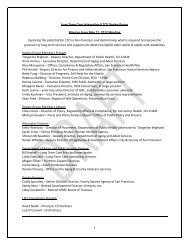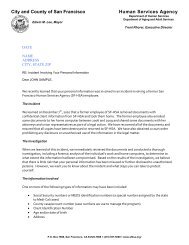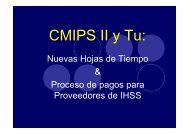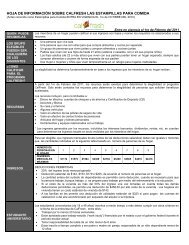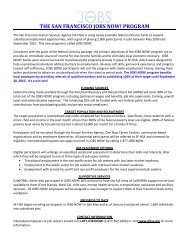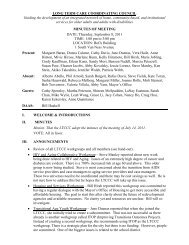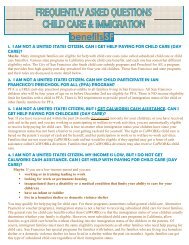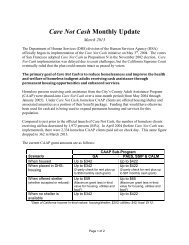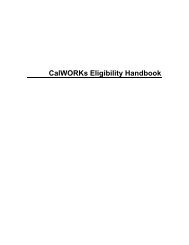Synopsis of Care Not Cash Implementation for - Human Services ...
Synopsis of Care Not Cash Implementation for - Human Services ...
Synopsis of Care Not Cash Implementation for - Human Services ...
You also want an ePaper? Increase the reach of your titles
YUMPU automatically turns print PDFs into web optimized ePapers that Google loves.
Emergency shelter is <strong>of</strong>fered to all homeless CAAP clients until they actually move into housing(i.e., clients referred to housing are <strong>of</strong>fered shelter while they complete the expedited referralprocess, and clients awaiting a housing referral are also <strong>of</strong>fered shelter). Homeless CAAP clientswho have logged the longest time in shelter are prioritized to receive housing referrals.Available <strong>Care</strong> <strong>Not</strong> <strong>Cash</strong> housing statistics through November ‘11 are as follows:• 3,691 homeless CAAP clients have moved into housing.• 9 homeless CAAP clients are currently active in the housing referral process.DHS’ Housing First Program, where clients have tenants’ rights, serves as the primary <strong>Care</strong> <strong>Not</strong><strong>Cash</strong> housing resource. Homeless CAAP clients may be referred to any Housing First Programhotel, although this group has exclusive access to the sub-group <strong>of</strong> hotels supported by <strong>Care</strong> <strong>Not</strong><strong>Cash</strong> funds. As <strong>of</strong> November 2011, there were 1,296 single room occupancy (SRO) hotel roomsbeing supported by <strong>Care</strong> <strong>Not</strong> <strong>Cash</strong>.In collaboration with DPH, <strong>Care</strong> <strong>Not</strong> <strong>Cash</strong> funding has allowed <strong>for</strong> the creation <strong>of</strong> a BehavioralHealth Roving Team. The goal <strong>of</strong> the Behavioral Health Roving Team is to provide medical andbehavioral health services to tenants living in the SRO Housing Program in order to stabilizethem in housing and avoid future episodes <strong>of</strong> homelessness. The case management part <strong>of</strong> theteam is supervised by UCSF/City-Wide Case Management and consists <strong>of</strong> two ClinicalSupervisors, five social workers and a substance abuse specialist. The medical part <strong>of</strong> the teamis comprised <strong>of</strong> a psychiatrist and two nurse practitioners employed and supervised by theDepartment <strong>of</strong> Public Health. The case management team outreaches to and engages clients thatare referred by on-site staff at the hotels. The team employs a range <strong>of</strong> interventions to helpstabilize residents, including mental health and substance abuse services, vocational andentitlements assistance, and skills groups. The DPH staff provides medical and psychiatricassessments on-site in the hotels and collaborates closely with the case management team in thedevelopment and implementation <strong>of</strong> treatment plans to best serve the needs <strong>of</strong> the hotelpopulation and enhance stability in housing. The Behavioral Health Roving Team also makesreferrals to the DPH Housing and Urban Health Clinic.Each month an updated version <strong>of</strong> this memo and the accompanying “<strong>Care</strong> <strong>Not</strong> <strong>Cash</strong> MonthlyStatistical Report” will be posted to the HSA web site (go to www.sfhsa.org and click on theright-hand menu “Data, Reports and Publications” link and then choose the “Housing andHomeless Reports” link).Page 2 <strong>of</strong> 2




